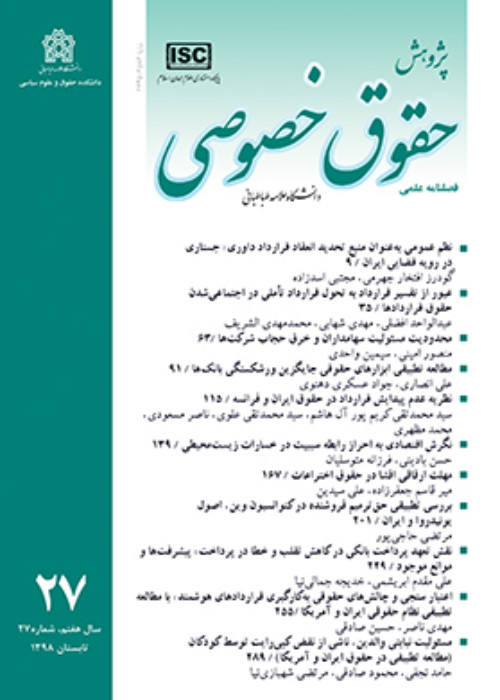Simultaneous Employment in Companies and other Competing Agencies in the Laws of Iran and the United States of America
Simultaneous employment in companies and other competing agencies can be considered from different point of view. One of these is to examine it from the point of view of its conflict with competition, which is examined in competition law. Considering the important impact that competition has for the progress of society, supporting competition through the adoption of effective regulation is one of the duties of governments. Supporting competition through legislation is done in different ways, one of which is the introduction of anti-competitive behavior. In relation to simultaneous employment in competing companies, the main question that arises is whether this behavior is anti-competitive or not? And on the assumption of contradiction, is this contradiction enough to require prohibition by the legislator. Although the role of simultaneous employment in competing companies for commercial and industrial progress cannot be completely denied, there is no doubt that it increases the possibility of information exchange and collusion between competing companies in various fields such as product pricing and as a result, it causes the competition between these companies to be reduced or eliminated. Therefore, it has been recognized and prohibited as anti-competitive behavior in the laws of Iran and the United States of America. In addition to the main question above, several secondary questions are also raised in this context, which are: Should the ban be applied to all companies or some of them, which is more important? Should the prohibition only apply to directors and officers of the company or all employees? Should this be absolutely prohibited or only if it disrupts competition? What is the criteria for considering two companies as competitors? The basic principle in relationto determining the scope of prohibition of simultaneous employment is that the prohibition should be established as much as necessary and have a minimal aspect. Regarding this issue, regardless of some similarities, there are important differences between the two countries, some of the differences are due to the different approaches of the two countries to fight it and it is normal, but in Iran's regulations, on the one hand, the domain of agencies and individuals who are subject to the act , it is expanded in an unusual way, and on the other hand, the criteria provided for the conditions of competition realization and the concept of competing companies are not very precise, which makes it less effective. In addition to the point of competition, this issue can also be investigated from the point of view of the legal relationship of a person with the company in which he is employed. Because when a person is employed in a company, certain duties and obligations are created for him in order to strive for the success of the company and refrain from doing contrary behaviors, and the question is whether working at the same time in a rival company is contrary to these obligations? There is a possibility that in the employment contract, a person is prohibited from competing with the employer, in which case she will adhere to the condition, but if such a condition is not included, the matter needs to be investigated. There is no regulation in this regard in the studied countries. In American law, according to the rules of common law, this is contrary to the fiduciary relationship of a person with the company, as well as contrary to his duty of loyalty to it, and is prohibited. It should also be considered prohibited in Iranian law, because employment in a rival company can lead to behavior contrary to the interests of the first company. It is important to point out that there is a difference between the two mentioned states. Prohibition of simultaneous employment in competing companies due to its anti-competitiveness is intended to protect the community and is related to public order and has an imperative aspect and cannot be agreed upon. While it is prohibited from the point of view of conflicting with the relationship between the person and the company, it is to protect the rights of the company and is not related to public order, and an agreement against it is possible. Because this may have positive effects in some cases, such as when two companies cooperate in some fields.
- حق عضویت دریافتی صرف حمایت از نشریات عضو و نگهداری، تکمیل و توسعه مگیران میشود.
- پرداخت حق اشتراک و دانلود مقالات اجازه بازنشر آن در سایر رسانههای چاپی و دیجیتال را به کاربر نمیدهد.


